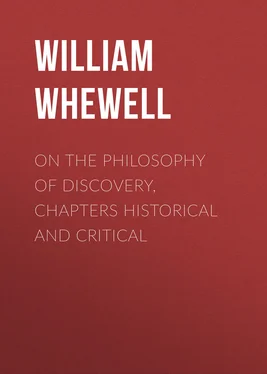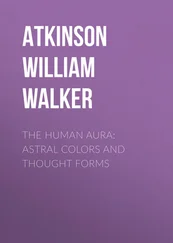William Whewell - On the Philosophy of Discovery, Chapters Historical and Critical
Здесь есть возможность читать онлайн «William Whewell - On the Philosophy of Discovery, Chapters Historical and Critical» — ознакомительный отрывок электронной книги совершенно бесплатно, а после прочтения отрывка купить полную версию. В некоторых случаях можно слушать аудио, скачать через торрент в формате fb2 и присутствует краткое содержание. Жанр: foreign_prose, foreign_religion, Философия, foreign_psychology, foreign_antique, на английском языке. Описание произведения, (предисловие) а так же отзывы посетителей доступны на портале библиотеки ЛибКат.
- Название:On the Philosophy of Discovery, Chapters Historical and Critical
- Автор:
- Жанр:
- Год:неизвестен
- ISBN:нет данных
- Рейтинг книги:5 / 5. Голосов: 1
-
Избранное:Добавить в избранное
- Отзывы:
-
Ваша оценка:
- 100
- 1
- 2
- 3
- 4
- 5
On the Philosophy of Discovery, Chapters Historical and Critical: краткое содержание, описание и аннотация
Предлагаем к чтению аннотацию, описание, краткое содержание или предисловие (зависит от того, что написал сам автор книги «On the Philosophy of Discovery, Chapters Historical and Critical»). Если вы не нашли необходимую информацию о книге — напишите в комментариях, мы постараемся отыскать её.
On the Philosophy of Discovery, Chapters Historical and Critical — читать онлайн ознакомительный отрывок
Ниже представлен текст книги, разбитый по страницам. Система сохранения места последней прочитанной страницы, позволяет с удобством читать онлайн бесплатно книгу «On the Philosophy of Discovery, Chapters Historical and Critical», без необходимости каждый раз заново искать на чём Вы остановились. Поставьте закладку, и сможете в любой момент перейти на страницу, на которой закончили чтение.
Интервал:
Закладка:
4. For we must remark, that although (as we have seen) he was not the only, nor the earliest writer, who declared that the time was come for such a change, he not only proclaimed it more emphatically, but understood it, in its general character, much more exactly, than any of his contemporaries. Among the maxims, suggestions and anticipations which he threw out, there were many of which the wisdom and the novelty were alike striking to his immediate successors;—there are many which even now, from time to time, we find fresh reason to admire, for their acuteness and justice. Bacon stands far above the herd of loose and visionary speculators who, before and about his time, spoke of the establishment of new philosophies. If we must select some one philosopher as the Hero of the revolution in scientific method, beyond all doubt Francis Bacon must occupy the place of honour.
We shall, however, no longer dwell upon these general considerations, but shall proceed to notice some of the more peculiar and characteristic features of Bacon's philosophy; and especially those views, which, occurring for the first time in his writings, have been fully illustrated and confirmed by the subsequent progress of science, and have become a portion of the permanent philosophy of our times.
(II.) 5. A New Era announced. —The first great feature which strikes us in Bacon's philosophical views is that which we have already noticed;—his confident and emphatic announcement of a New Era in the progress of science, compared with which the advances of former times were poor and trifling. This was with Bacon no loose and shallow opinion, taken up on light grounds and involving only vague, general notions. He had satisfied himself of the justice of such a view by a laborious course of research and reflection. In 1605, at the age of forty-four, he published his Treatise of the Advancement of Learning , in which he takes a comprehensive and spirited survey of the condition of all branches of knowledge which had been cultivated up to that time. This work was composed with a view to that reform of the existing philosophy which Bacon always had before his eyes; and in the Latin edition of his works, forms the First Part of the Instauratio Magna . In the Second Part of the Instauratio, the Novum Organon , published in 1620, he more explicitly and confidently states his expectations on this subject. He points out how slightly and feebly the examination of nature had been pursued up to his time, and with what scanty fruit. He notes the indications of this in the very limited knowledge of the Greeks who had till then been the teachers of Europe, in the complaints of authors concerning the subtilty and obscurity of the secrets of nature, in the dissensions of sects, in the absence of useful inventions resulting from theory, in the fixed form which the sciences had retained for two thousand years. Nor, he adds 169 169 Lib. 1. Aphor. 78 et seq.
, is this wonderful; for how little of his thought and labour has man bestowed upon science! Out of twenty-five centuries scarce six have been favourable to the progress of knowledge. And even in those favoured times, natural philosophy received the smallest share of man's attention; while the portion so given was marred by controversy and dogmatism; and even those who have bestowed a little thought upon this philosophy, have never made it their main study, but have used it as a passage or drawbridge to serve other objects. And thus, he says, the great Mother of the Sciences is thrust down with indignity to the offices of a handmaid; is made to minister to the labours of medicine or mathematics, or to give the first preparatory tinge to the immature minds of youth. For these and similar considerations of the errors of past time, he draws hope for the future, employing the same argument which Demosthenes uses to the Athenians: "That which is worst in the events of the past, is the best as a ground of trust in the future. For if you had done all that became you, and still had been in this condition, your case might be desperate; but since your failure is the result of your own mistakes, there is good hope that, correcting the error of your course, you may reach a prosperity yet unknown to you."
(III.) 6. A change of existing Method. —All Bacon's hope of improvement indeed was placed in an entire change of the Method by which science was pursued; and the boldness, and at the same time (the then existing state of science being considered), the definiteness of his views of the change that was requisite, are truly remarkable.
That all knowledge must begin with observation, is one great principle of Bacon's philosophy; but I hardly think it necessary to notice the inculcation of this maxim as one of his main services to the cause of sound knowledge, since it had, as we have seen, been fully insisted upon by others before him, and was growing rapidly into general acceptance without his aid. But if he was not the first to tell men that they must collect their knowledge from observation, he had no rival in his peculiar office of teaching them how science must thus be gathered from experience.
It appears to me that by far the most extraordinary parts of Bacon's works are those in which, with extreme earnestness and clearness, he insists upon a graduated and successive induction , as opposed to a hasty transit from special facts to the highest generalizations. The nineteenth Axiom of the First Book of the Novum Organon contains a view of the nature of true science most exact and profound, and, so far as I am aware, at the time perfectly new. "There are two ways, and can only be two, of seeking and finding truth. The one, from sense and particulars, takes a flight to the most general axioms, and from those principles and their truth, settled once for all, invents and judges of intermediate axioms. The other method collects axioms from sense and particulars, ascending continuously and by degrees , so that in the end it arrives at the most general axioms; this latter way is the true one, but hitherto untried."
It is to be remarked, that in this passage Bacon employs the term axioms to express any propositions collected from facts by induction, and thus fitted to become the starting-point of deductive reasonings. How far propositions so obtained may approach to the character of axioms in the more rigorous sense of the term, we have already in some measure examined; but that question does not here immediately concern us. The truly remarkable circumstance is to find this recommendation of a continuous advance from observation, by limited steps, through successive gradations of generality, given at a time when speculative men in general had only just begun to perceive that they must begin their course from experience in some way or other. How exactly this description represents the general structure of the soundest and most comprehensive physical theories, all persons who have studied the progress of science up to modern times can bear testimony; but perhaps this structure of science cannot in any other way be made so apparent as by those Tables of successive generalizations in which we have exhibited the history and constitution of some of the principal physical sciences, in the Chapter of a preceding work which treats of the Logic of Induction. And the view which Bacon thus took of the true progress of science was not only new, but, so far as I am aware, has never been adequately illustrated up to the present day.
7. It is true, as I observed in the last chapter, that Galileo had been led to see the necessity, not only of proceeding from experience in the pursuit of knowledge, but of proceeding cautiously and gradually; and he had exemplified this rule more than once, when, having made one step in discovery, he held back his foot, for a time, from the next step, however tempting. But Galileo had not reached this wide and commanding view of the successive subordination of many steps, all leading up at last to some wide and simple general truth. In catching sight of this principle, and in ascribing to it its due importance, Bacon's sagacity, so far as I am aware, wrought unassisted and unrivalled.
Читать дальшеИнтервал:
Закладка:
Похожие книги на «On the Philosophy of Discovery, Chapters Historical and Critical»
Представляем Вашему вниманию похожие книги на «On the Philosophy of Discovery, Chapters Historical and Critical» списком для выбора. Мы отобрали схожую по названию и смыслу литературу в надежде предоставить читателям больше вариантов отыскать новые, интересные, ещё непрочитанные произведения.
Обсуждение, отзывы о книге «On the Philosophy of Discovery, Chapters Historical and Critical» и просто собственные мнения читателей. Оставьте ваши комментарии, напишите, что Вы думаете о произведении, его смысле или главных героях. Укажите что конкретно понравилось, а что нет, и почему Вы так считаете.












